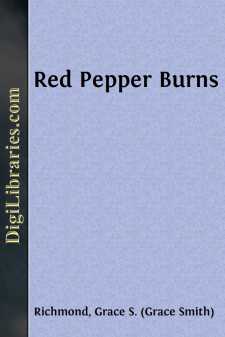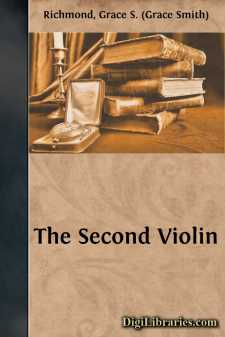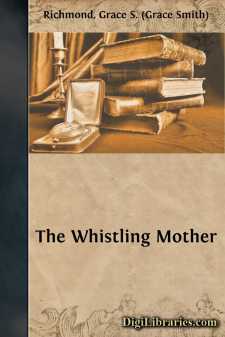Categories
- Antiques & Collectibles 13
- Architecture 36
- Art 48
- Bibles 22
- Biography & Autobiography 813
- Body, Mind & Spirit 142
- Business & Economics 28
- Children's Books 17
- Children's Fiction 14
- Computers 4
- Cooking 94
- Crafts & Hobbies 4
- Drama 346
- Education 46
- Family & Relationships 57
- Fiction 11829
- Games 19
- Gardening 17
- Health & Fitness 34
- History 1377
- House & Home 1
- Humor 147
- Juvenile Fiction 1873
- Juvenile Nonfiction 202
- Language Arts & Disciplines 88
- Law 16
- Literary Collections 686
- Literary Criticism 179
- Mathematics 13
- Medical 41
- Music 40
- Nature 179
- Non-Classifiable 1768
- Performing Arts 7
- Periodicals 1453
- Philosophy 64
- Photography 2
- Poetry 896
- Political Science 203
- Psychology 42
- Reference 154
- Religion 513
- Science 126
- Self-Help 84
- Social Science 81
- Sports & Recreation 34
- Study Aids 3
- Technology & Engineering 59
- Transportation 23
- Travel 463
- True Crime 29
Grace S. (Grace Smith) Richmond
Grace Smith Richmond was an American author known for her popular romance novels in the early 20th century. Born in 1866, her most famous work is "Red Pepper Burns," a series featuring a charismatic and compassionate country doctor. Richmond's writing is celebrated for its warmth, character depth, and portrayal of rural American life.
Author's Books:
Sort by:
CHAPTER I HEART BURNINGS She did not want to hate the girls; indeed, since she loved them all, it would go particularly hard with her if she had to hate them; love turned to hate is such a virulent product! But, certainly, she had never found it so hard to be patient with them. They were all five her college classmates, of only last year's class, and it was dear and kind of them to drive out here...
more...
CHAPTER I. IN WHICH HE VOWS A VOW "There comes the Green Imp." "How can you tell?" "Don't you hear? Red's coming in on five cylinders for all he can get out of 'em. Anybody else would stop and fix up. He's in too much of a hurry—as usual." The Green Imp tore past the porch where Burns's neighbours waved arms of greeting which he failed to see, for he...
more...
WHOLLY GIVEN OVER TO SENTIMENT The Green Imp, long, low and powerful, carrying besides its two passengers a motor trunk, a number of bulky parcels, and a full share of mud, drew to one side of the road. The fifth April shower of the afternoon was on, although it was barely three o'clock. Redfield Pepper Burns, physician and surgeon, descended from the car, a brawny figure in an enveloping gray...
more...
CHAPTER I AN INTELLIGENT PRESCRIPTION The man in the silk-lined, London-made overcoat, holding his hat firmly on his head lest the January wind send its expensive perfection into the gutter, paused to ask his way of the man with no overcoat, his hands shoved into his ragged pockets, his shapeless headgear crowded down over his eyes, red and bleary with the piercing wind. "Burns?" repeated the...
more...
CHAPTER I FIVE MILES OUT The four Lanes—Max, Sally, Alec and Robert—climbed the five flights of stairs to their small flat with the agility of youth and the impetus of high but subdued excitement. Uncle Timothy Rudd, following more slowly, reached the outer door of the little suite of rooms in time to hear what seemed to be the first outburst. "Well, what do you think now?" "Forty-two...
more...
CHAPTER I Crash! Bang! Bang! "The March of the Pilgrims" came to an abrupt end. John Lansing Birch laid down his viola and bow, whirled about, and flung out his arms in despair. "Oh, this crowd is hopeless!" he groaned. "Never mind any other instrument, providing yours is heard. This march is supposed to die away in the distance! You murder it in front of the house. That second...
more...
CHAPTER I THE CURTAIN RISES ON A HOME None of it might ever have happened, if Richard Kendrick had gone into the house of Mr. Robert Gray, on that first night, by the front door. For, if he had made his first entrance by that front door, if he had been admitted by the maidservant in proper fashion and conducted into Judge Calvin Gray's presence in the library, if he had delivered his message, from...
more...
I have the greatest mother on earth. I can't call her a "little mother," for she's five feet six inches tall, and weighs just exactly what she ought to according to the table of weights. If she were a trifle less active she might put on too much flesh, but she'll never keep still long enough for that. I always enjoy having her along on any kind of an outing, for she's game...
more...
I ALTHEA Nothing impairedbut all disordered.—Midsummer Night's Dream. There are four guest-rooms in my house. It is not a large house, and how there came to be so many rooms to spare for the entertaining of friends is not a story to be told here. It is only a few years since they were all full—and not with guests. But they are nearly always full now. And when I assign each room it is after...
more...
I BROWN HIMSELF Brown was so tall and thin, and his study was so low and square, that the one in the other seemed a misfit. There was not much in the study. A few shelves of books—not all learned books by any means—three chairs, one of them a rocker cushioned in a cheerful red; a battered old desk; a broad and rather comfortable looking couch: this was nearly all the study's furniture. There...
more...











